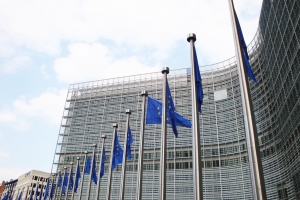Recovery Plan: The Federal Government has determined its projects
 © premier.be
© premier.beOn a proposal by Prime Minister Alexander De Croo and State Secretary for Recovery Thomas Dermine, the Federal Government today agreed on the outline of projects selected in the framework of the "Facility for Recovery and Resilience" (FFR) set up by the European Union.
"The health crisis caused by the COVID-19 pandemic has caused an economic and social shock of unprecedented brutality for our country," said Prime Minister Alexander De Croo.
"Strong actions to curb the epidemic, maintain employment, support companies in difficulty and protect the most vulnerable groups have been taken by the federal government to respond to the short-term challenges posed by the crisis," continues the Prime Minister.
"Nevertheless, the need for an immediate response to the health, economic and social crises must be accompanied by an ambitious recovery plan that meets the country's structural challenges," adds Secretary of State Thomas Dermine.
"Reviving the economy and making our country more prosperous, more resilient and greener in the long term requires massive investment," says Thomas Dermine.
The proposed investment plan aims to be ambitious, coherent and targeted on five structuring axes:
Climate/Sustainability & Mobility axis
The recovery plan offers a unique opportunity to accelerate the transition to more sustainable and efficient public infrastructure. The federal government proposes to invest almost €900 million in the public infrastructure of the future.
In the field of energy, the federal government plans to invest 245 million euros in infrastructure to promote emerging technologies and to prepare the country's transition to a more sustainable economy:
- A backbone for the transport of CO2 and H2, which will enable a significant reduction in CO2 emissions, particularly in target sectors such as refining, steel or chemicals (€95M)
- An energy island to deploy a second offshore wind farm, prepare interconnections with other countries and enable energy storage (€100m)
- The development and integration of new technologies to reduce CO2 emissions from new gas-fired power plants. (50M€) In addition, the Government will support the promotion of new technologies and value chains in the circular economy, particularly in the field of toxic chemicals (€35M).
In the field of transport and mobility, an ambitious investment programme of €365 million is proposed to modernise our rail network, to greatly improve its performance (higher commercial speed, better capacity utilisation, greater intermodality, etc.), and to encourage the digitisation of user services. A high-performance rail system will make it possible to meet the mobility challenges for our citizens and to accelerate the modal shift from road to rail for goods.
In addition, a tax incentive for the installation of electric recharging stations accessible to the public will be provided to initiate the electrification of the car fleet (€32M).
To speed up the renovation of the public building stock, the Government intends to allocate €170 million to the renovation of public buildings for which the needs are most urgent, in particular for the Cinquantenaire museums and the Brussels Palace of Justice. In parallel with these efforts on certain buildings, a strategy will be pursued to achieve energy neutrality for all federal buildings by 2040 by putting in place a structured approach based in particular on energy performance contracts.
Finally, to strengthen the influence of its capital, the Federal Government will invest 50 million via Beliris in public space projects to further strengthen its mobility infrastructure and the tourist and international attractiveness of Brussels.
Productivity & Inclusion Axis
The Government will invest more than 350 million euros in the area of social inclusion and support for research and development.
To this end, the recovery plan is also an opportunity to lay the foundations for a society focused on innovation. From the Internet to vaccines, major advances in knowledge and technology have generally been stimulated by public investment. The government intends to devote a budget of ~165 million euros to research and development efforts in targeted areas :
- Nuclear research for medical applications to develop more effective cancer treatment and more sustainable methods of isotope production (€35M)
- New technologies to optimise our processes in the fight against drug trafficking in the port of Antwerp (€70m)
- The development of research in the field of climate and green aeronautics (€35M)
- Minimisation of radioactive waste with a view to the decommissioning of nuclear power plants (€25M)
The Government also intends to develop open military campuses that will help to revitalise the economy of urban areas by providing employment opportunities for young people while collaborating with businesses and educational institutions to promote the sharing of knowledge and technology (€100m).
The Government will ensure that the recovery benefits everyone and strengthens the country's social and economic cohesion in three areas :
- Digital inclusion - the ongoing digitisation of Belgian society must be pursued without excluding the most vulnerable groups of the population. Digital inclusion programmes aimed at ensuring that all citizens have access to technology and information regardless of their income or social situation will be put in place (€30M).
- E-health - Integrating our healthcare systems and processes in the digital age by implementing more efficient and patient-centric e-health platforms (€40M)
- The fight against recidivism - Reducing recidivism for specific target groups (e.g. first-time offenders) via a social impact bond mechanism. This mechanism based on a results-based logic would serve as a pilot that could open the door to innovative funding mechanisms in the field of public policy (€15M).
Digital axis
Internally, too, the federal state must evolve and appropriate new technologies. The digitalisation of the administration remains insufficient today in Belgium, particularly in comparison with our European neighbours. The recovery plan should be a lever enabling Belgium to catch up by adapting the public service to the expectations of the 'connected citizen' while protecting it against the risks of cyber attacks. In response to these imperatives, the government proposes to invest 380 million euros in structural digital projects:
- Accelerating the necessary digitisation of the pillars of our public services, with a focus on justice and legal procedures and social security institutions in contact with citizens, businesses and the self-employed (€300M).
- Protecting our society against cyber threats by investing in cyber security (€80M)
Conclusion
"While promoting recovery and resilience, this plan also guarantees the start of an ecological transition, as more than half of the investments are directly dedicated to achieving climate neutrality by 2050", emphasises Prime Minister Alexander De Croo. "The plan is also ambitious in terms of digitalisation, with a quarter of the investments going towards the digital transition. In this sense, this Belgian federal plan is greener and more digital than expected by Europe and will enable our country to embark on a digital and ecological transition", concludes Secretary of State Thomas Dermine.
In total, the federal projects will respectively contribute 50% and 30% of the European Commission's contribution requirements for the environmental and digital transitions.
To date, all of the country's entities have therefore finalised the first selection of its projects and Belgium will be able to send them to the European Commission during the course of next week in order to continue the exchanges and refine the projects with a view to the final submission of the plan on 30 April.


